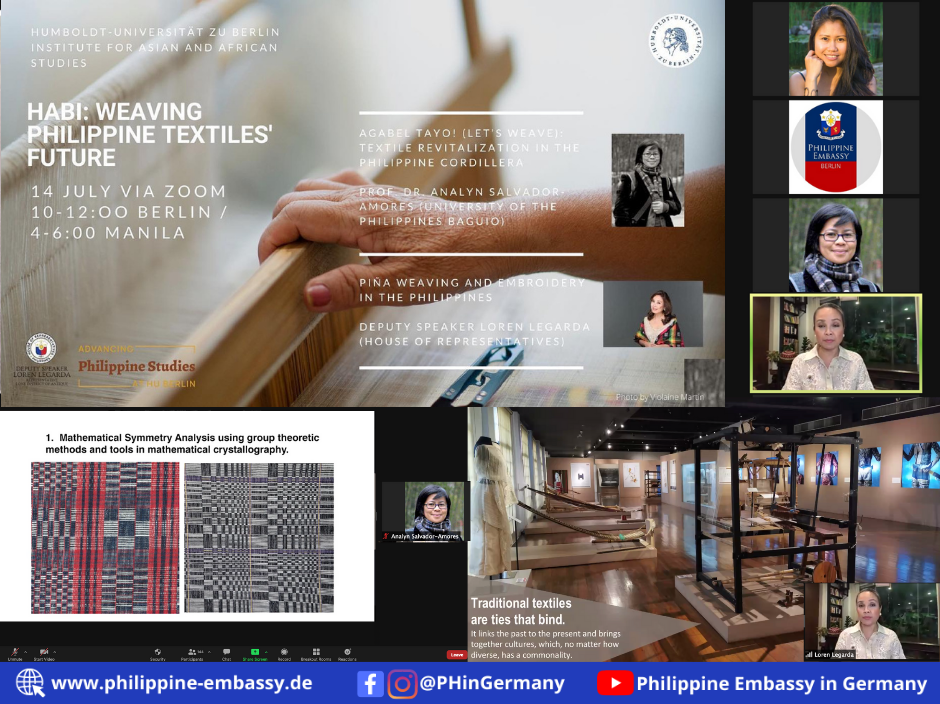Deputy Speaker Legarda Legarda and Dr. Analyn Salvador-Amores are Featured Speakers on Philippine Textiles at Humboldt University
15 July 2021, Berlin – Humboldt University (HU), one of the largest universities in Europe, through its Advancing Philippine Studies Program and in partnership with the Philippine Embassy in Berlin held an online panel discussion entitled “Habi: Weaving Philippine Textiles’ Future,” on 14 July 2021 with guest speakers Deputy Speaker of the Philippine House of Representatives Loren Legarda and Dr. Analyn Salvador-Amores of the University of the Philippines-Baguio and the Museo Kordilyera. The discussion was one of the best attended sessions co-organized by the Philippine Embassy this year with over 140 participants eager to learn more about the textile weaving culture of the Philippines.
Dr. Salvador-Amores shared with the audience how cultural revival of weaving and production of textiles is taking place in the Cordillera Region of the Philippines through the Cordillera Textiles Project or CordiTex, a multi-disciplinary research approach in analyzing textile production and how this tradition can be made sustainable in contemporary times. It is the goal of advocacy projects like CordiTex, which brings together cultural studies and technology, to empower weaving communities and sustain the critical cultural practice of weaving.
Deputy Speaker Legarda, one of the most vocal and active champions of Philippine cultural preservation, shared efforts by the Philippine legislature and other institutions in the promotion and preservation of Philippine weaves and weaving culture. The Deputy Speaker focused on the production of pineapple fiber-sourced weaves more popularly known in the Philippines as piña and piña-seda (pineapple silk) to illustrate the urgent need to preserve and sustain Philippine weaving traditions and production.
She spoke of the need for convergence in the efforts of legislators like herself, in pushing for responsive legislation and the effective implementation of sustainable programs by all stakeholders in the entire weaving process. She emphasized that it literally takes an entire community of advocates and practitioners to realize this and in the process engender cultural preservation and identity, promote sustainable practices, institutionalize fair trade practices, provide livelihood, and cultivate Filipino artistry.
Deputy Speaker Legarda also showed photos of more than a century old Philippine artifacts, including piña items and Philippine weaves, donated by Philippine national hero Dr. Jose P. Rizal and now housed at the Berlin Ethnological Museum.
Likewise present at the talk were Philippine Ambassador Theresa Dizon-De Vega, German Ambassador Anke Reiffenstuel, Prof. Dr. Vincent Houben of Humboldt University’s Institute for Asian and African Studies, and Dr. Rosa Cordillera A. Castillo of Humboldt University and Program Director for the Advancing Philippine Studies Program who served as session moderator.
Advancing Philippine Studies at HU aims to advance and promote Philippine and Filipino studies through various academic and research platforms. The program is made possible through the efforts of Deputy Speaker Legarda who facilitated the program grant, Humboldt University, and the Philippine Embassy in Berlin. END




